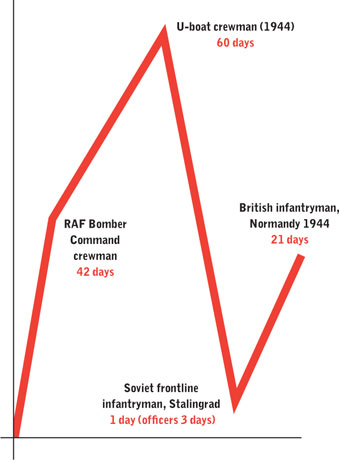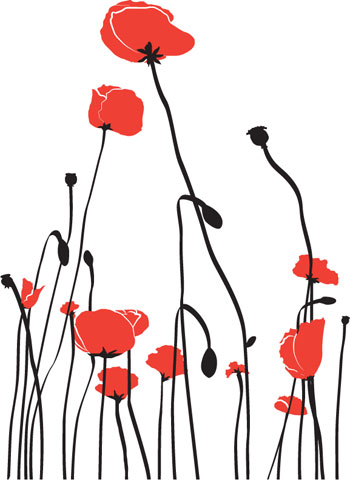Read The Book of the Poppy Online
Authors: Chris McNab
The Book of the Poppy (9 page)


ONE OF THE
challenges of writing, and reading, military history is making a meaningful human connection with the individuals of the past. This is particularly a problem regarding major wars, when individuals fight and die in extremely large numbers. At the Battle of Stalingrad, for example, the best part of 1 million individuals died in the clashes of 1942–43, a figure that is simply too great to grasp on a human level. The danger is that all those who were involved with the battle become an undifferentiated mass, prey to historical platitudes and assumptions.
As an author I have spent much of my adult life reading and researching military history. During this time, I have read hundreds of first-hand accounts and non-fiction histories, visited numerous battlefields and military bases, and interviewed dozens of serving soldiers and veterans. From this research, one thing has become clear to me – military personnel are as diverse in character as the rest of the world. One of the reasons why I am still compelled by military history is because in it you find the absolute best and the absolute worst of human character, and soldiers, sailors and airmen occupy every grade of that spectrum. We should neither put all military personnel on a pedestal, nor treat them all with suspicion. Instead, we should try to find ways in which they come alive as individuals, looking at them as much as possible through their actions and their words.
First-hand accounts are one of the best ways of making the voices of war come alive. I was first made aware of this fact through my father, Brian McNab, who was 10 years old when the Second World War began in 1939. During my youth, my father recounted an event that fascinates me to this day, if only because hundreds of thousands of people of his generation would have had similar experiences. During the Blitz of 1940–41, Brian sat out the war in relative safety on Thornes Road, Wakefield, North Yorkshire. German bombers sometimes passed overhead, but their main targets were the great industrial cities such as Leeds, Sheffield and Manchester (my father recounted seeing the glow in the night sky on the horizon as Sheffield burned). Yet with each outlying raid, the people of Wakefield still had to follow Air Raid Precautions. For my father, his mother and his sister Jean – his father was an ARP warden so would be out on duty – this meant going next door to Mrs Clegg’s house, and sitting out the night in a cold, damp and dull cellar deep beneath the ground. When the all-clear sounded, they would ascend the stairs in the morning, tired and aching.
Most nights spent in this way were completely uneventful, a fact that bred complacency. On the night of 14 March 1941, the group had been huddled down in the cellar for hours. There was no sound from above – no droning aircraft, no anti-aircraft fire in the distance, no shouted warnings. At one point, just before 10.50 p.m., the decision was made to ascend the cellar stairs and go into the living room for a good cup of tea. What they did not know was that high above was a single German Heinkel He 111 bomber. It had been heading for Sheffield with two SC 1000 1,000kg (2,200lb) high-explosive bombs, but British radar jamming had thrown off its navigation. Now, all the aircrew were concerned about was getting home, and to do that quicker they had to lighten the load. Brian takes up the story:
She [Mrs Clegg] came out with the tea … and we were saying how it had all been very quiet tonight when we heard a slow drone in the sky. It was just a gentle hum. And we wondered whether we ought to go down into the cellar again, but nothing happened so we stayed put. Then as we were sat there the droning got nearer and nearer. We felt at this point that we should go back to the cellar, but we suddenly heard a whistle in the sky, getting louder and louder. It started off right in the distance but built to a crescendo … we seemed to be listening to this, absolutely transfixed, for ages. Then it seemed as if the heavens had opened, an unbelievable roar. The windows came out. The blast threw us all forward out of the sofa into the fireplace, then hurled up back while at the same time soot came rushing out of the chimney and covered us. I would have sworn that the bomb was on our house next door …
In fact, the bombs had not hit the McNab house, as they discovered when they finally emerged from the cellar into which they fled again. Yet with just two bombs, the community had been devastated. Six neighbours had been killed, including (according to my father’s memories of what his father later reported) twin infants who were discovered dead in their cots without a mark on them, just rendered white by falling plaster. A woman whom they knew personally had been decapitated. Several houses were completely demolished and the entire street was covered in a thick layer of soot, sucked out of the chimneys by the bombs’ vacuum. Brian remembered finding a piece of still-warm bomb fragment stuck in their fence, having passed through the family garage and the car inside it.
This narrative has power for me because it can be attached to a real person. In turn, this reminds me that those who died were also real people, their lives abruptly snuffed out in a single random bombing in 1941. Had the German pilots not flicked the bomb release switch at the moment they did, then the two infant boys might still be alive today, and the other dead might have lived long and fruitful lives.
FAMOUS WAR PHOTOGRAPHERS

FRONTLINE VOICES:
BATTLE OF BALACLAVA
Battlefield journalism was born in earnest during the nineteenth century. Arguably the first modern war reporter was British-Irish correspondent William Howard Russell, whose reports on the Crimean War (1853–56) gave the reading public a deeper insight into the realities of war. Here is part of his account of the most famous action of the conflict, the ‘Charge of the Light Brigade’, during the Battle of Balaclava on 25 October 1854:
At 11:00 our Light Cavalry Brigade rushed to the front … The Russians opened on them with guns from the redoubts on the right, with volleys of musketry and rifles.
They swept proudly past, glittering in the morning sun in all the pride and splendor of war. We could hardly believe the evidence of our senses. Surely that handful of men were not going to charge an army in position? Alas! It was but too true – their desperate valor knew no bounds, and far indeed was it removed from its so-called better part – discretion. They advanced in two lines, quickening the pace as they closed towards the enemy. A more fearful spectacle was never witnessed than by those who, without the power to aid, beheld their heroic countrymen rushing to the arms of sudden death. At the distance of 1200 yards the whole line of the enemy belched forth, from thirty iron mouths, a flood of smoke and flame through which hissed the deadly balls. Their flight was marked by instant gaps in our ranks, the dead men and horses, by steeds flying wounded or riderless across the plain. The first line was broken – it was joined by the second, they never halted or checked their speed an instant. With diminished ranks, thinned by those thirty guns, which the Russians had laid with the most deadly accuracy, with a halo of flashing steel above their heads, and with a cheer which was many a noble fellow’s death cry, they flew into the smoke of the batteries; but ere they were lost from view, the plain was strewed with their bodies and with the carcasses of horses. They were exposed to an oblique fire from the batteries on the hills on both sides, as well as to a direct fire of musketry.

WINDOWS ON THE PAST
The account of the bombing in Wakefield perfectly illustrates the value of memories, original documents and first-hand accounts to understand the true nature of conflict during times of remembrance. The types of primary sources we can draw on to open these windows to the past are extremely diverse, but all make their own contribution. For example, the following is from a letter written on 28 May 1918 from one Captain R. Hulbert Dadd, ‘B’ Company, 5th Machine Gun Battalion, to the mother of a soldier killed in action:
I regret very much to inform you that your son Pte. A.G. Harrison, No. 62732 of this Company was killed in action on the night of the 21st instant. Death was instantaneous and without any suffering.
The Company was taking part in an attack and your son’s gun team was one of these which advanced against the enemy. The attack was successful, and all guns reached and established new positions. Later in the night the enemy shelled our lines and one shell fell on your son’s gun killing him and wounding a comrade.
It was impossible to get his remains away and he lies in a soldier’s grave where he fell. I and the C.O. and all the Company deeply sympathise with you in your loss.
Your son always did his duty and now has given his life for his country. We all honour him, and I trust you will feel some consolation in remembering this.
His effects will reach you via the Base in due course.
The letter is a model of self-control, born no doubt from having to write such letters on numerous occasions. Some lines speak volumes. The statement that ‘Death was instantaneous and without any suffering’ was commonplace in such missives, wishing to spare the bereaved the distress of violent details (although of course sometimes the statement was perfectly true). The captain explains that it was impossible to retrieve his body, implying that either the attack had to press ahead with no time to collect the dead, or that the ground was lost to the enemy, or that there wasn’t enough of a body left to take back to the rear. The final line about the return of the effects has an unusual poignancy; a mother would receive a box containing simple personal items, objects that just days or weeks previously had been turned in the hands of a precious son.
Letters from the frontline to loved ones back home always carry an emotional power. On one level this is because the letters were not written with the intention of publication. As the letter writer was communicating with a specific person or group of people, typically loved ones, the emotions and priorities of the writer seem more visible and real. We also often see soldiers writing letters that significantly downplay the dangers they face, to prevent their loved ones from worrying. However, on some occasions the writer has to face the issue of death openly, and express full feelings about the war in which they are involved.
